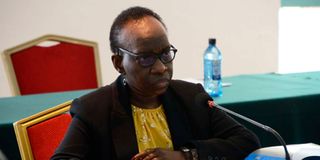Scandal of Sh4bn that Uwezo Fund chiefs can’t account for

Auditor-General Nancy Gathungu. Her report on the Uwezo Fund for the year ending June 2021, she flagged the fund for internal control weaknesses.
When government spokesperson Cyrus Oguna on June 6 convened the ‘Sema Na Spox’ forum — a carefully scripted public relations exercise that offers positive publicity to government programmes — Uwezo Fund was among the three featured.
What was clear, however, was the differences in viewpoints between the fund’s CEO, Mr Peter Lengapiani and the audience on the same issue.
“So far, Uwezo Fund Oversight Board has disbursed a total of Sh7.1 billion to all the constituencies as loans to 76,474 groups. The absorption rate of the fund stands at 106.75 per cent, implying that all the funds allocated to the constituencies have been disbursed to groups of youth, women and people living with disability (PWDs),” Mr Lengapiani said.
Mr Jacob Okanga Jagongo, who was following the discussion being streamed live through the government spokesperson’s Facebook page asked: “How do we apply for these funds? Anybody who has applied and received please share it!??? Here NOW TUONE”, exposing the discontent about the publicly funded programme created to boost access to cheap credit by youth, women and PWDs.
Unaware of its mandate
While Mr Lengapiani said the fund had reached more than 10 million Kenyans since inception, a majority of the audience appeared unaware of its mandate, while others indicated it had been inaccessible.
“Nothing more difficult in Kenya than accessing Uwezo Fund,” said a Mr Pondi Collins.
“At the moment, we have Sh1.2 billion in our various accounts and I would like to urge our young people to access this funding,” said Mr Lengapiani, adding that Uwezo had supported 49,173 women groups, 25,358 youth groups and 1,943 PWDs groups.
What the CEO did not say at the PR event, however, was that when the auditor-general knocked on his door asking to see the list of groups supported by the fund over the years for audit, there was none.
He also failed to disclose that some of the fund’s constituency offices shut down years ago and that taxpayers are staring at a loss of at least Sh4.6 billion pumped into the fund, but which the management cannot account for.
Internal control weaknesses
In Auditor-General Nancy Gathungu’s report on the fund for the year ending June 2021, she flagged the fund for internal control weaknesses in its administration at the constituency level, risking the loss of at least Sh4.64 billion lent out to various groups since inception. Ms Gathungu identified that the fund management issued loans without following procedure and has lacked proper means to ensure repayment.
“However, a review of records maintained at sampled Constituency Uwezo Fund offices revealed failure to institute measures for effective follow up of beneficiaries of loans, leading to high loan defaulters.
“The records further revealed deficiencies in documentation, authorisation and approvals of loans to prevent irregular loans. Individual loan accounts and details of loan beneficiaries were not maintained in Muhoroni and Khwisero constituencies. Further, some groups were given loans yet there was no evidence of approval and completed application forms,” Ms Gathungu stated.
She added that when auditors visited Uwezo Fund’s Bureti Constituency offices, “there were no operations since the offices have been dormant since 2016 and, as a result, outstanding loans may not be recovered”.
“In view of the above, the effective management and recoverability of the loans may not be achieved. This raises doubt on the controls put in place to implement the activities of the fund to achieve the intended purpose,” Ms Gathungu said in the report dated May 13, 2022.
Flagged for mismanagement
It is not the first time the Auditor-General is flagging Uwezo Fund for mismanagement, since in the past three years, reports from the office have shown the dangers inside the fund meant to benefit Kenyan youth, women and PWDs.
The reports have warned of an imminent collapse of the fund for failing to implement prudential financial management policies, with the amount at risk increasing from Sh3.9 billion in the year to June 2019, Sh4.1 billion in the year to June 2020 and now Sh4.6 billion in the year to June 2021.
It is not clear why the fund management has failed to furnish auditors with records of groups loaned money since inception, yet at the PR event the CEO was ready to churn out the figures.
The Nation has contacted the office more than four times, including making physical visits to its head office in Lonrho House, Nairobi, with questions regarding running of the fund, but senior officials hid in their offices or fled when they heard of the presence of journalists.
Among questions put forward were measures the fund has taken to ensure the money lent out is paid back, the number of its constituency offices that have closed down and guidelines followed while issuing loans so as to minimise chances for default.
Two loan products
Ideally, the fund is supposed to offer two loan products; Wezesha loan for first-time borrowers who should get between Sh50,000 and Sh100,000 to support their enterprises, and Endeleza loan for repeat borrowers who can get up to Sh500,000.
On its website, the fund says it has disbursed a total of Sh6.1 billion, Sh1 billion less than what the CEO said it had issued. The website says since inception, Sh290.3 million has been disbursed in constituencies across Nairobi, Sh170.5 million in constituencies across Kisii, Sh157 million in Homa Bay, Sh153.3 million in Busia, Sh276.7 million in Nakuru and Sh22 million in Lamu.
“From Uwezo Fund, the challenge is that some of our young men and women are not coming forward, going to visit the youth offices to be advised,” Mr Oguna said at the Sema Na Spox event. During the event, the fund said a total of Sh2.5 billion has been repaid since inception of Uwezo Fund, representing a repayment rate of 39.4 per cent.





